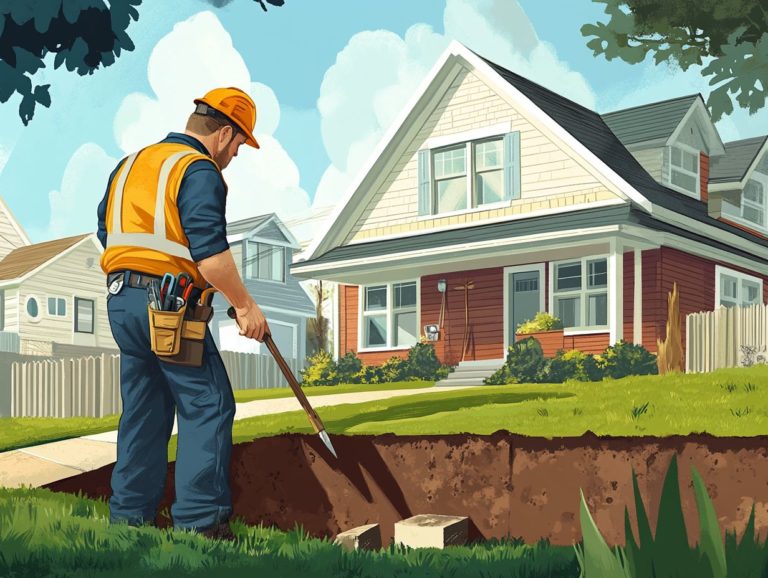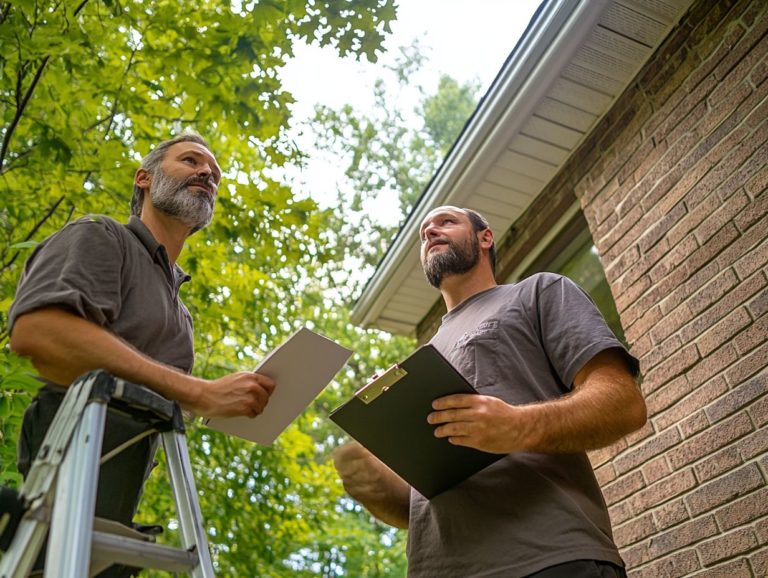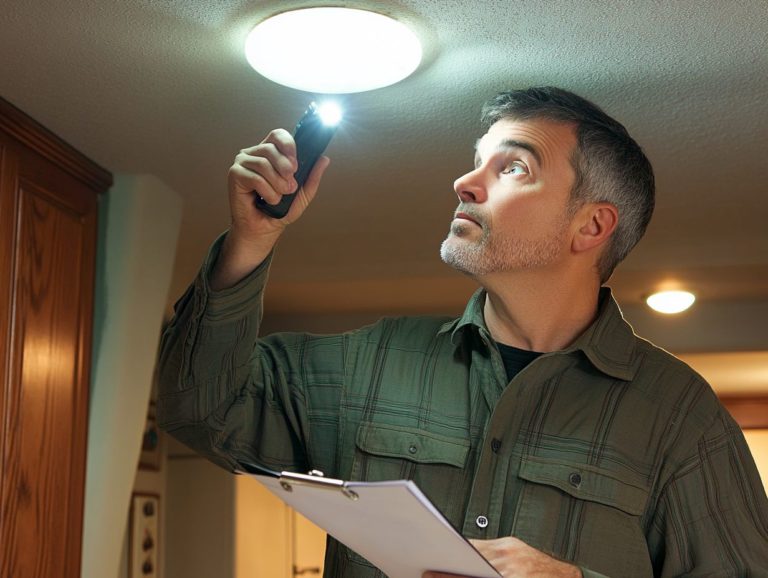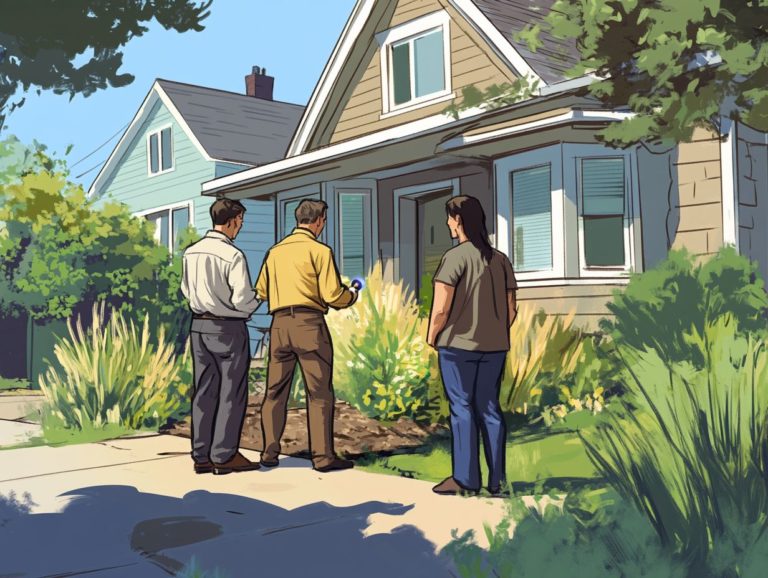The Role of Home Inspections in Buyer-Seller Negotiations
Navigating the home buying process can feel like stepping into a labyrinth, especially when it comes to understanding home inspections. These assessments provide vital insights into a property’s condition, allowing you to make informed decisions that could significantly impact your investment.
Let s dive into the world of home inspections! You’ll learn why they matter and how to use the information to your advantage. This article covers what a home inspection involves, why it s essential, and how to effectively interpret the resulting report. You’ll also discover how to leverage this information during negotiations, ensuring you secure the best deal possible.
Whether you’re a first-time buyer or a seasoned homeowner, this guide is designed to empower you to approach inspections with confidence and clarity.
Contents
- Key Takeaways:
- Unlocking the Secrets of Home Inspections
- The Home Inspection Process
- Interpreting the Inspection Report
- Using the Inspection Report in Negotiations
- Frequently Asked Questions
- What is the role of home inspections in buyer-seller negotiations?
- When should a home inspection be done during the negotiation process?
- Who typically pays for the home inspection?
- What happens if the home inspection reveals significant issues?
- Can a home inspection affect the final sale price?
- Is a home inspection necessary for all real estate transactions?
Key Takeaways:

- Home inspections are a crucial step in the buying process.
- Be prepared; inspections can take a few hours and cover all major systems.
- Effective communication during negotiations leads to better outcomes.
Unlocking the Secrets of Home Inspections
Understanding home inspections is an essential phase in the real estate journey, particularly for buyers and sellers in Raleigh, North Carolina.
A comprehensive home inspection offers an in-depth evaluation of a property’s condition, uncovering potential issues that may influence the negotiation of the purchase agreement. For sellers, understanding the home inspection process is crucial to navigate this aspect effectively.
By enlisting the expertise of professionals like Bryan & Bryan, you can approach this pivotal step with assurance and precision, which is crucial for achieving a successful real estate transaction.
What is a Home Inspection?
A home inspection is your opportunity to gain an in-depth understanding of a property’s condition. A qualified inspector meticulously evaluates various components, including the structure, systems, and appliances.
The inspector focuses on critical areas such as the roof, plumbing, electrical systems, and heating and cooling systems, diligently searching for potential issues that could lead to expensive repairs. You might encounter common findings like leaks, faulty wiring, or insulation problems, all of which can impact your comfort and safety.
The inspection report is vital. It provides an unbiased look at the property’s condition, guiding negotiations and ultimately swaying the decisions of both buyers and sellers. This comprehensive document not only underscores necessary repairs but also provides peace of mind, ensuring that everyone involved has a clear understanding of the property’s condition.
Why are Home Inspections Important?
Home inspections are essential for you, whether you’re buying or selling, as they provide complete disclosure about the property’s condition, enabling you to make informed decisions during negotiations.
By uncovering potential issues early on, these inspections facilitate smoother transactions. As a buyer, understanding the home inspection process allows you to make more accurate offers and reduces the likelihood of surprises after the purchase.
Sellers gain significant advantages; addressing issues in advance not only boosts the property’s appeal but can also prevent delays at closing. A thorough inspection report highlights the role of home inspections in the home buying process, enabling both you and the other party to negotiate better terms in the purchase agreement, fostering a sense of trust and transparency that is vital in real estate transactions.
The Home Inspection Process
The home inspection process encompasses several crucial steps that you, as either a buyer or a seller, should fully grasp to navigate this vital phase of a real estate transaction with confidence and ease.
Understanding these steps will enable you to make informed decisions and ensure a smoother experience in the real estate market.
Get your home inspected today to avoid surprises tomorrow!
What to Expect During a Home Inspection

During a home inspection, expect a detailed evaluation of the property’s condition. Inspectors cover everything from structure to HVAC systems and document it all in a report.
They examine critical areas like the roof, plumbing, electrical systems, and foundation. This ensures no vital aspect of the home is overlooked.
Findings are carefully recorded, spotlighting issues needing immediate attention or repair. These insights can greatly affect your decision-making process.
For example, problems like outdated wiring or leaks can lead to hefty repair costs. The report becomes a powerful negotiation tool, helping you understand necessary interventions.
A thorough home inspection not only informs you about the property’s state but also empowers you to make smart purchasing decisions.
How Long Does a Home Inspection Take?
A home inspection typically takes two to four hours. The time varies based on the property’s size and condition, especially in the Raleigh, North Carolina market.
Complex systems, from plumbing to electrical work, can affect this timeframe. Larger properties may require more time as inspectors delve into details.
Specific inspection requests, like concerns about mold or aging roofing, can also extend the process. Inspectors using comprehensive checklists and modern technology may take longer but will provide a more thorough analysis.
This often leads to a better homebuying experience for you.
Interpreting the Inspection Report
Interpreting the inspection report is crucial for buyers and sellers. This document reveals essential findings that can impact your negotiations, especially regarding the role of home inspections in new construction.
Understanding its details enables informed decisions that shape your real estate deal.
What is Included in the Report?
A thorough inspection report lists findings from your home inspection. It outlines issues related to the property’s structure, systems, and potential repair costs.
Beyond general observations, the report discusses major systems like plumbing and electrical work. It highlights specific concerns such as leaks or foundation cracks.
Grasping these issues is vital for making informed decisions about the property’s value. The report also includes repair cost estimates, clarifying your future financial responsibilities.
How to Understand and Prioritize Issues
Understanding and prioritizing issues in the inspection report is key for both buyers and sellers. Familiarizing yourself with the role of home inspections in real estate helps effectively strategize your next steps in negotiations.
Evaluate the severity of each issue. This allows you to distinguish between minor fixes, like a leaky faucet, and major repairs like a faulty foundation.
Recognizing these differences not only helps you make informed choices but also shows which issues need immediate attention during negotiations. Prioritize critical repairs to foster productive discussions and request concessions that reflect the property s condition.
Using the Inspection Report in Negotiations

Using the inspection report in negotiations is vital for buyers and sellers. It provides clear documentation of the property’s condition, forming a solid basis for price renegotiations or repair requests.
How to Negotiate Based on Inspection Findings
Negotiating on inspection findings requires a strategic approach. You must consider repair costs and the property’s overall condition from both the buyer’s and seller’s perspectives, keeping in mind the role of home inspections in real estate transactions.
Present the findings clearly to create a strong foundation for discussion. Clearly explain how these findings relate to necessary repair costs to justify your requests.
Fostering a cooperative dialogue improves interaction. Actively listen and show mutual respect to build trust for effective negotiations.
Aim to reach an agreement that excites both sides. It should reflect a fair outcome based on inspection results.
Tips for a Successful Negotiation
For successful negotiations, adopt a proactive approach. Embrace responsive negotiation while considering earnest money to strengthen your position.
Keep communication open to foster productive dialogue. Clearly express your needs and actively listen to the other party’s concerns.
Practice empathy to understand different perspectives. This paves the way for fair outcomes.
Show a willingness to compromise to create a collaborative atmosphere. Earnest money signals commitment and builds trust for smoother negotiations.
Frequently Asked Questions
What is the role of home inspections in buyer-seller negotiations?
Home inspections provide an objective look at a property’s condition. They help identify potential issues and necessary repairs, serving as a basis for negotiating the sale price and terms.
When should a home inspection be done during the negotiation process?

Conduct a home inspection after the buyer makes an offer but before finalizing the purchase agreement. This helps buyers understand the property’s condition before committing.
Who typically pays for the home inspection?
The buyer usually pays for the home inspection as part of their due diligence. Sometimes, sellers may cover the cost as a goodwill gesture or based on sale terms.
What happens if the home inspection reveals significant issues?
If significant issues arise, the buyer can negotiate with the seller to address them. This may involve requesting repairs, a price reduction, or even canceling the sale.
Can a home inspection affect the final sale price?
Yes, a home inspection can affect the final sale price. Buyers may negotiate a lower price if significant issues are found. Conversely, the value of home inspections for home sellers can provide more leverage in pricing if the inspection is clean.
Is a home inspection necessary for all real estate transactions?
A home inspection isn t legally required in most states, but it’s highly recommended. It provides valuable insights for both parties and helps avoid surprises during negotiations.






